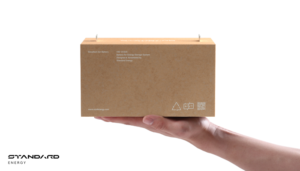A personal struggle with knee pain led Anmol Ajay Saxena to turn into an entrepreneur in 2016, and embark on a journey to democratise musculoskeletal healthcare using wearable technologies.
Realising the potential of physiotherapy in helping people with chronic skeletomuscular conditions or injuries, Anmol began working on a solution to help people understand their muscle health and track their progress.
In 2019, she founded Hyderabad-based Ashva WearTech (Ashva Wearable Technologies) and launched Fitknees, a sensor-based knee injury monitoring platform that helps patients track progress with regular reports and empowers them to stick to their physiotherapy treatment.
Dr Padmanaban Sekaran, Chief of Rehabilitation Services at Sparsh Group of Hospitals, holds the responsibility of CSO and mentor at Ashva.
Fitmust [Image Credit: Ashva Weartech]
Speaking to YS, Anmol, Director and Founder-CEO of Ashva WearTech, says her on-field research data revealed that eight in 10 patients with chronic knee pain did not return after their first session.
During this journey, the team began learning about medically accurate ways of measuring different parameters of joints and muscles. One of the most important parameters, they realised, was muscle strength.
This April, Ashva Weartech launched Fitmust, a handheld muscle strength dynamometer, to measure muscle strength in a more medically accurate manner.
The microprocessor-based dynamometer accurately measures muscle strength and monitors progress, and aims to help diagnose and treat musculoskeletal or sports injuries.
“Whenever you get injured, your physiotherapist or orthopaedic surgeon will always look at your muscle strength. Also, when you go to a gym, your key parameter of health is the cardiovascular system. That’s why we do cardio exercises to improve the muscles of our lungs and our heart. The second parameter is your body’s muscle strength — how strong your neck, biceps, triceps, legs, etc. are. That is how we got interested in developing a more accurate way of measuring muscle strength and arrived at Fitmust, a fully integrated testing solution for muscle strength,” Anmol says.
[Image Credit: Ashva Weartech]
Testing isometric muscle strength
Anmol reveals that Fitmust was launched as a part of the startup’s Fitknees product to create a holistic reporting system for chronic knee pain. However, the team realised that Fitmust also had applications beyond lower limb measurement.
“By just swapping a fixture, we can actually measure one’s smaller joints like wrist and elbow. With bigger fixtures, we can measure one’s shoulders, hip, knee, ankle, among others. So, we launched it as a separate product line,” she says.
Speaking about measuring muscle strength, the founder explains that a method called 10-RM testing is used — the patient or user does 10 repetitions of exercises such as bench press and leg press for upper and lower body muscular strength testing until the muscle is tired. The maximum weight one can lift is measured as muscle strength.
Image Credit: Ashva Weartech
Apart from this, the second most accurate method to test muscle strength is by using an isokinetic dynamometer, a large motorised machine that can cost up over Rs 1 crore.
“We wanted to develop an even more accurate way of testing your muscles. We use another way to measure isometric muscle strength — one pushes their muscles against the wall or another surface to feel the tension in them. This way of measurement is currently done manually; the doctor may ask the patients to push their muscles against their hands. However, this is not an accurate way as the doctor might be stronger or weaker than the patient, causing inaccurate readings,” she explains.
Fitmust was launched to solve this problem. The doctors, physiotherapist, or fitness trainee will still put their hands against the patient’s muscle but using a device. This device is designed to give an accurate measurement of muscle strength.
Patients undergoing treatment and physiotherapy will be able to take this test and monitor their progress regularly.
Anmol adds that users can also access reports through a mobile application. “Muscles are a strong progress indicator for users to understand if their muscle health is improving with physiotherapy or not,” she says.
Illustration: YS Design
Business and more
Anmol says Ashva Weartech operates on a B2B model; products are sold to rehabilitation centres, orthopaedic centres, gyms, and more. Both Fitknees and Fitmust have completed clinical trials; Fitknees is undergoing a paid pilot.
“We have deployed seven products so far. We are looking to expand our product line and across India,” she says.
Vellore Institute of Technology — Technology Business Incubator (VITTBI)-incubated Ashva Weartech has been supported by DST Nidhi Prayas and Birac Seed Fund through VITTBI. Currently, the startup is in the process of raising its angel funding.
Anmol reveals that the startup aims to expand its reach to at least 150 to 200 centres in the next one year. She declines to share pricing details, but reveals that the startup is looking to clock in Rs 50 lakh this year.
According to a report by ResearchAndMarkets, the wearable devices market in India is expected to reach a sales volume of 16.22 million units by 2024, from 4.72 million in 2019, growing at a CAGR of 26.33 percent.
Other notable players, including Soujhe Innovative Healthcare Devices, are also working to solve physiotherapy-related challenges using wearable technology.
YS’s flagship startup-tech and leadership conference will return virtually for its 13th edition on October 25-30, 2021. Sign up for updates on TechSparks or to express your interest in partnerships and speaker opportunities here.
For more on TechSparks 2021, click here.
Applications are now open for Tech30 2021, a list of 30 most promising tech startups from India. Apply or nominate an early-stage startup to become a Tech30 2021 startup here.






![Read more about the article [Funding alert] Edtech startup Practically raises $5M from NB Ventures, Earlsfield Capital, others](https://blog.digitalsevaa.com/wp-content/uploads/2021/12/CopyofImageTaggingNewBrandingEditorialTeamMaster-1639563204964-300x150.jpg)



